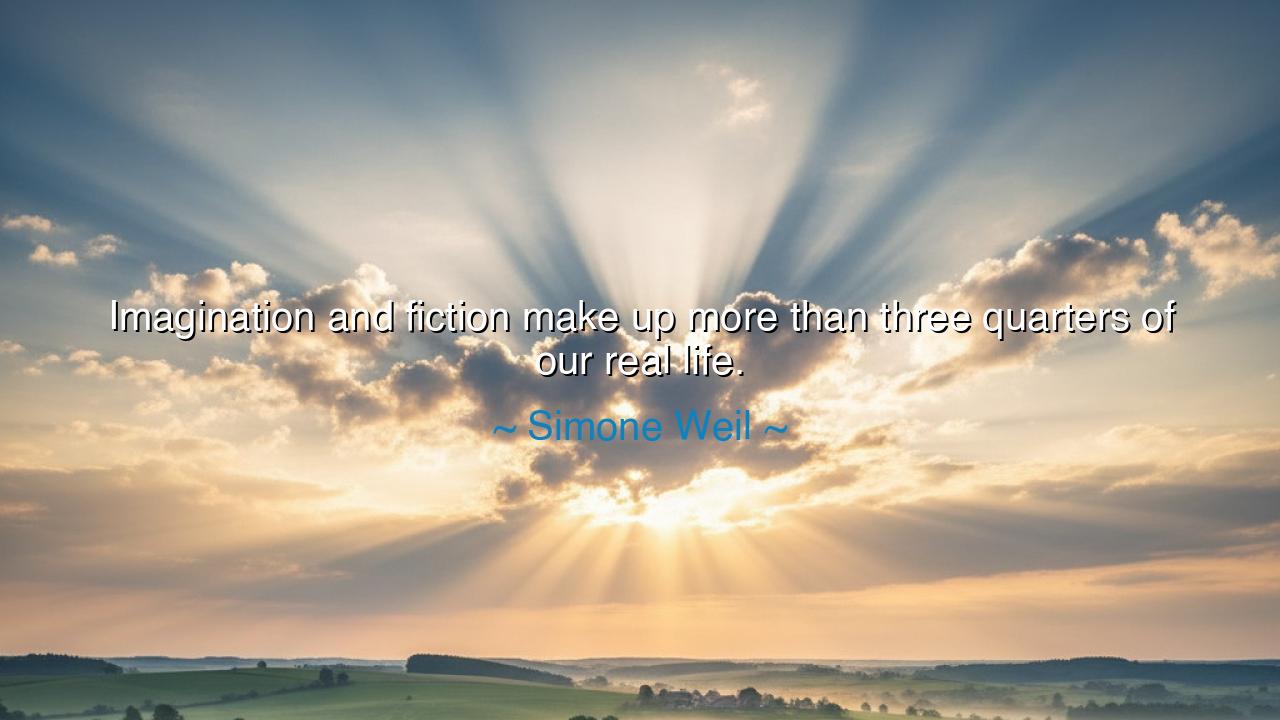
Imagination and fiction make up more than three quarters of our






The mystic and philosopher Simone Weil, who walked the border between spirit and sorrow, once wrote: “Imagination and fiction make up more than three quarters of our real life.” Her words shimmer like a paradox, yet beneath them lies a truth profound and unsettling. Weil, who spent her short life seeking purity of thought and compassion for the suffering, understood that what we call “reality” is not merely the world we touch and see—it is the world we believe, dream, and invent within ourselves. Our thoughts, our fears, our hopes—all are woven from the fabric of imagination, and through them we create the meaning of existence itself.
To say that imagination and fiction compose most of our life is not to accuse us of illusion, but to reveal that the mind is the great architect of reality. What we perceive is filtered through what we think, what we desire, what we remember. The warrior, the poet, the mother, the beggar—all live not only in the physical world, but in the invisible realm of inner stories. Our joys are shaped by our expectations, our sorrows by our interpretations. We do not live in the world as it is; we live in the world as we imagine it to be. This, Weil knew, is both our power and our peril.
Look, for instance, upon the life of Christopher Columbus. The man crossed oceans not because he knew what lay beyond, but because he imagined it. His vision of a world beyond the horizon was pure fiction to those around him—an impossible dream, a myth told by a fool. Yet from that fiction he drew courage, faith, and action, and the world itself changed beneath his feet. His voyage reminds us that every great deed begins first as imagination—a vision unproven, a story told to the self until it becomes true. So it has always been: before the invention, the poem, the revolution, there is first the dream.
But fiction does not only dwell in grand visions; it lives in the heart of the everyday. The man who believes he is unloved lives in the fiction of his despair; the woman who sees beauty in hardship lives in the fiction of hope. Our emotions, our ambitions, our sense of identity—all arise from inner narratives we tell ourselves. The young imagine the future and are moved to strive; the weary imagine loss and begin to fade. Weil’s wisdom is a mirror, showing us that our “real life” is not made only of bread and stone, but of invisible forces: belief, fear, memory, and longing. We are creatures of the unseen, builders of invisible empires.
Yet Weil’s tone, if we listen closely, carries not only wonder but warning. For imagination, when unguarded by truth, can become a deceiver. The same power that lifts us to creation can cast us into delusion. Nations fall to war because men imagine themselves righteous and others monstrous. Lovers destroy one another because they imagine betrayal where none exists. The soul, drunk on its own inventions, may lose sight of reality and wander the labyrinth of illusion. Thus Weil reminds us that while fiction sustains life, it must be illuminated by conscience and wisdom, lest it devour what is real.
The wise therefore cultivate imagination as both servant and teacher. They know it must be fed with truth, not fantasy; with empathy, not vanity. When imagination is guided by love, it becomes the mother of art and mercy. When it is guided by pride, it becomes the architect of ruin. The saints, the poets, and the visionaries are those who have disciplined the dream. They do not deny the fictional nature of life—they sanctify it, turning imagination into a vessel for truth rather than a mask for self-deception.
So, my listener, learn to recognize the stories that rule your life. Ask yourself each day: what part of what I believe is real, and what part is the story I have chosen to tell? Choose your fiction wisely, for it will become your world. Imagine goodness, and you will act with kindness. Imagine meaning, and your days will find purpose. Imagine hope, and you will endure despair. For though the visible world may crumble, the imagination, when aligned with truth, remains the eternal fountain of life.
Thus Weil’s words become not merely reflection, but commandment: Guard your imagination, honor your fiction, and let them serve truth rather than escape it. For in the end, the boundary between what is real and what is imagined is not a wall but a bridge—and across that bridge, the soul must walk to find itself.






AAdministratorAdministrator
Welcome, honored guests. Please leave a comment, we will respond soon